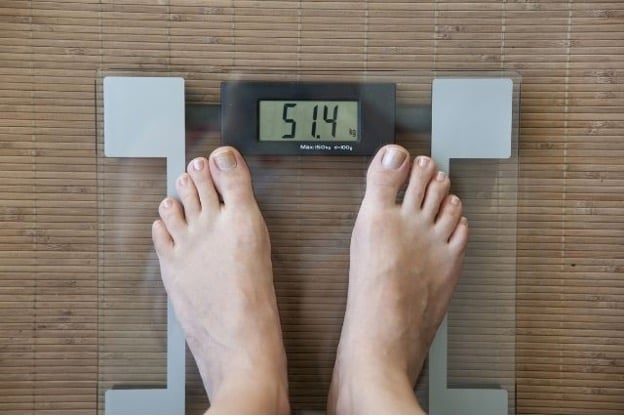Join Our Community
Get tips, recipes and deals sent to your inbox by entering your email.
Kickstart Your Weight Loss: 30% Off New Memberships!

Weighing yourself is one way to track your progress and hold yourself accountable. But, how often should you weigh yourself? We share what we feel is the best weigh-in cadence.
If you’re trying to lose weight, weighing yourself on a scale is one way to track your progress and hold yourself accountable. You probably stepped on the scale to mark the starting point of your weight loss journey.
Expert opinions vary.
A study presented by the American Heart Association News found that daily weigh-ins help with accountability. At the same time, Healthline recommends weekly weigh-ins as long as it doesn’t trigger anxiety or disordered eating.
Insider.com advises you to ditch the scale altogether because they claim it’s unfair to base your success on one number that fluctuates.
Weigh-in frequency is a question we’re often asked about here at Profile. Based on our research and experience, we feel the best weigh-in cadence is once a week.

Certain factors can impact the number on the scale – whether it’s a weight loss or fluctuation. Remember that these changes are normal. The weight of an average adult can fluctuate up to 5 or 6 pounds per day. It always comes down to your lifestyle and habits.
Water retention is a major factor in weight gain or loss. This retention occurs if:
Other factors that may temporarily affect your weight include:
No matter what frequency you decide to weigh yourself, we recommend the following tips to help you succeed and feel good about your progress:
Weigh yourself at the same time each day. We suggest first thing in the morning after you go to the bathroom and before you eat breakfast. This gives you the best baseline to measure success.
Step on the scale wearing the same thing each time, even if it’s your birthday suit. If you checked your weight naked a week ago, do it also next week. Your clothing is weighed when you hop on the scale, so make sure you take that into account!
If possible, consider using a scale with Bioelectrical Impedance Analysis (BIA) that measures weight, body mass index, body fat percentage, muscle percentage, bone percentage, and hydration percentage. This gives you a more accurate picture of what’s going on inside your body.
Whether it’s an app or a paper calendar, document your progress as you go through the weight loss process.
Did you know that Profile Smart Body Scales link directly to the Profile Journey App to track your weight every time you step on the scale?
Don’t forget. There is more to your weight loss journey than a number on the scale. The scale is just one of many tools in your arsenal. Non-scale victories—as we like to call them—count, too.
Here are some examples of non-scale victories:

Is it bad to weigh yourself every day?
The answer depends on how you feel whenever you do it. Some people gain more benefits with daily weigh-ins. It helps them monitor their progress and detect any health issues whenever there is a sudden weight gain or loss.
Stepping on the scale regularly can motivate you to achieve your weight and health goals. However, for some, doing it too often may do more harm than good.
People who weigh themselves too frequently are more likely to have unhealthy behavior change and expose themselves to disordered eating issues like:
If you have a history of these conditions, it’s best to consult your health care provider first before you start to gain or lose weight.
If the numbers on the scale are too stressful for you and you can’t help but check them more often, consider seeing a mental health professional and talk to them about your weight and health dilemmas.
Remember that these numbers don’t define who you are. Don’t put your mental health in jeopardy to achieve your weight goal. After all, a healthy mind leads to a healthier you.
If you keep having negative reactions about yourself or your body every time you step on the scale, it may be a tell-tale sign for you to avoid it. There are other ways to keep track of your weight-loss efforts.
Ask your weight loss coach or your health care provider how you can keep track of your progress. Your options may include focusing on healthy nutrition, using a food journal, starting a workout log, conducting regular self-check-ins, and scheduling self-appreciation time.
You can still check your weight on the scale but not as frequently as you used to. Weigh yourself only if it’s part of your recommended weight-loss routine.
When deciding how often to weigh yourself, do what feels right for you. If you need the accountability of the daily weigh-ins, then do it.
If once a week encourages you, do that. Or, if you prefer to track your weight training progress by how you feel and how your clothes fit, then, by all means, take that approach instead.
Everyone is different, and what matters most is that you’re meeting your goals in a way that works for you.
Want to learn more tips that can help you live a happier and healthier life? Profile can help! Our science-based weight-loss program focuses on losing weight in a healthy way.
Profile’s delicious and flexible meal plans, motivational tracking tools, and compassionate, one-on-one coaching give you the encouragement, support, and accountability you need to meet your goals.
Find your custom weight loss plan by taking our two-minute plans quiz.
Get tips, recipes and deals sent to your inbox by entering your email.
*Individual results will vary. Active Profile Members following our program lose 1-3 pounds per week on average. In clinical trials, individuals receiving coaching lost about three times more weight than those without coaching. See full Terms of Service Agreement for details. Not available in select states or stores. Precise not available in all states.
**Not available in all states. See full Membership Agreement for full details.
Copyright © 2022 Profile Plan. All Rights Reserved.
Copyright © 2022 Profile Plan. All Rights Reserved.